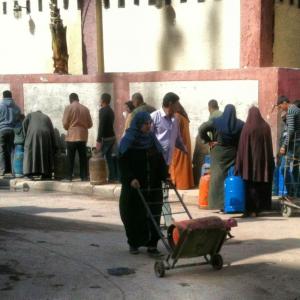(Lectionary for April 8, 2018)
 The Gospel of Luke is particularly concerned with the presence of the rich and the poor. One example: in the Sermon on the Mount, Matthew speaks of those who are “poor in spirit” (perhaps, “those who know of their spiritual needs”), for to them belongs the “realm of heaven,” while in Luke’s version, spoken he says on a plain, Jesus says, “Blessed are you who are poor,” period. They also possess the “realm of heaven,” but only because they are now simply without enough money. Thus, somehow the reign and rule of God is especially open to those without many resources.
The Gospel of Luke is particularly concerned with the presence of the rich and the poor. One example: in the Sermon on the Mount, Matthew speaks of those who are “poor in spirit” (perhaps, “those who know of their spiritual needs”), for to them belongs the “realm of heaven,” while in Luke’s version, spoken he says on a plain, Jesus says, “Blessed are you who are poor,” period. They also possess the “realm of heaven,” but only because they are now simply without enough money. Thus, somehow the reign and rule of God is especially open to those without many resources.
This special concern reappears with a vengeance in Luke’s second volume, the Acts of the Apostles. In chapters 4 and 5 of that work, Luke drops an economic bomb into the earliest Christian community, a bomb whose explosive residue has yet to be expended in our own time, even though Christians have seldom taken its power with much seriousness. The text for this day is about as clear as a text can be. After Luke announces the church’s inaugural appearance with the grand event of Pentecost (Acts 2), and after he delineates the marks of the emerging community, namely each believer’s eager willingness to “sell their possessions and goods and distribute to all, as any had need” (Acts 2:45), spending much time in the temple, and celebrating communion from house to house, while praising God and gaining the people’s good will, the result of all of this activity is that “the Lord added to their number those who were being saved” (Acts 2:47). In other words, sharing all things in common was a crucial element of early church evangelism. Such joy, such commonality of the community, such equality of goods and services, was distinctly attractive, and many exclaimed that they wanted some of that. There were, according to Luke, no rich or poor among the first Christians, an astonishing claim that probably by the time of Luke’s writing was no longer completely true.
It is most assuredly not true in the twenty-first century Christian communities that we see all around us. There are many poor folk among us Christians, albeit not many in the churches I frequent, and there are a few very wealthy people, and a whole passel of well-off folk, who at least know where their next few meals are coming from, and who possess the kinds of transportation and domiciles that make those meals readily accessible and comfortable and plentiful. A first-century church we are not in many and various ways, but this matter of the distribution of goods may be the most telling.
Acts 4:32-35 shames me every time I read it. “Now the whole group of those who believed were of one heart and soul, and no one claimed private ownership of any possessions, but everything they owned was held in common.” Really? The fact of private ownership has become nothing less than the hallmark of American success. What I own—my house, my car, my clothes, etc.—defines for the world a good deal of what I am in that world. This communal living as practiced by the early Christians would be nothing less than anathema for the great majority of twenty-first century believers. Indeed, the failed experiments of such living—Oneida, New York and even the more modern Sojourners community of Washington D.C.—speak volumes about the difficulties of such societal arrangements.
It is hard for human beings to share their stuff with their sisters and brothers and to keep an eagle eye out for any around who have needs calling out to be met. Acts hurls the power of this set-up right into our faces. “There was not a needy person among them, for as many who owned lands or houses sold them and brought the proceeds of what was sold. They laid it at the apostles’ feet, and it was distributed to each as any had need.” It has been said that Karl Marx was familiar with these shocking words when he was musing about an economic system that he hoped would replace the ferocious oligarchic control of so much of the capital of his homeland. He thundered that in the world he dreamed, “To each according to his ability, and to each according to his need,” the seed of the Communist experiment that guided huge parts of the world for nearly 80 years in Russia, and still has resonance in China, Vietnam, Venezuela, Cuba, and North Korea, however much those countries have opened the floodgates to something more like capitalism in reality.
In light of the portrait that Luke offers of the economy of first-century Christianity, our world presents something so different as to be unrecognizable. As appalling as it may be to admit, now 10 people in our world—10!—hold as much economic resource as fully 1⁄2 of the global population. That is, 10 people weigh as much economically as 3 1⁄2 billion of the globe’s inhabitants. We are certainly a very long way from the picture of Acts 4!
And in our own country, the gulf between owner and worker grows ever wider. The CEO of Amazon now makes something like $100,000,000 more than an assembly line worker in one of Amazon’s distribution warehouses. And I fear I underestimate the gulf this day that has probably opened even wider. In a world where such a reality can be recognized and named, the Gospel of John’s famous and mistakenly appropriated, line that “the poor you have with you always,” must now be changed. It is, it appears, in our world to be the rich you will always have with you, and in a world of shrinking resources and dangerous climate change, the presence of the rich is in no way a very good thing. As fewer and fewer individuals control more and more of the economic power, the restiveness and sense of unfairness grows apace. How long before a human explosion takes place; how long before the myriad poor demand forcefully more of what the few have appropriated for themselves?
Our current administration in Washington has created and attempted to implement its policies on the basis of the rich among us becoming richer and then suddenly becoming more willing to share what they have with the poorer around them. History teaches that this is a foolish belief that has never happened in any reality we know. The model of Acts is hardly what a Trumpian world envisions. The richer, the better, they say. A rising rich tide lifts all boats, they claim. That simply is a hopeless idea, proven false again and again. Acts surely has this right: it will not be a better world unless and until “great grace” falls on all, whether currently rich or poor, enabling them to see the needs of those around them, causing them to act for the needy among them, alleviating their needs, assuaging their lack of resources by giving some to them directly. In short, when too few have too much, and too many have too little, the realm and rule of God is blocked, and the rich we will always have with us. Utopian? Without a doubt! Yet, according to Luke, for one brief shining hour, the Christians got this right. Bless them, I say, and bless those among us today who still hold out the guttering torch for our world that has moved so far in the opposite direction.
(Images from Wikimedia Commons)











